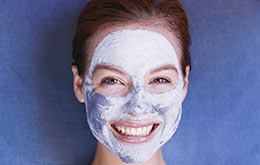Is advice you run a test on your skin that will enable you know the type of skin you have and possibly know the type of mask that will suit your skin.

Facial Mask comes in various types, each is meant to treat or correct a
particular skin abnormality, in attend to make the face beautiful. The
most common masks in this part of the world include: Clay mask, Peel-off
mask, Mint masks, Mud pack masks, Fruit masks and pure Herbal masks.
The Herbal masks are often a mixture of native Chucks, Egg, Honey and a
mixture of Oath milk for aged persons.
Read:
How to Beautify your Face with Facial Scrub Today
According to Reader's Digest "
Whether it's a cleanser, lotion, or mask—no skin-care product should cause burning or stinging. "This is often a sign that you're allergic to it," explains S. Manjula Jegasothy, MD, dermatologist and founder of Miami Skin Institute. Also known as contact dermatitis, this reaction is your skin's defense mechanism to shield itself from the offending ingredient, whether it's a fragrance, preservatives, or other additives. "Some enzyme and acid-based masks can cause mild stinging of the skin for about a minute, but, if your skin feels like it's on fire, do not suffer in the name of beauty—wash it off!" says Alan J. Parks, MD, board-certified dermatologist and founder of DermWarehouse. "You're either allergic to something in the product or your skin is simply too sensitive for whatever it contains." Don't miss these 11 rules for people with sensitive skin.
This scenario is different than if you were using a new product for the first time. Your skin has already proved, in the times you've used the product previously, that it can handle whatever ingredients the product contains. "Slight stinging and burning are common side effects (especially those that have an alcohol or 'drying' base) in patients with pre-existing skin sensitivity, such as eczema or rosacea," says Terrence Keaney, MD, board-certified dermatologist and RealSelf contributor. "In patients with sensitive skin, it's important that they carefully select products that are designed for their skin type." Another possibility is that you're simply using too much of the product or using it too frequently. "Generally, a pea-sized amount of product is enough to cover the entire facial surface for any given product," says Jegasothy. "Do not use more than this, and don't use it more frequently than recommended; more is not more when it comes to skin care."








